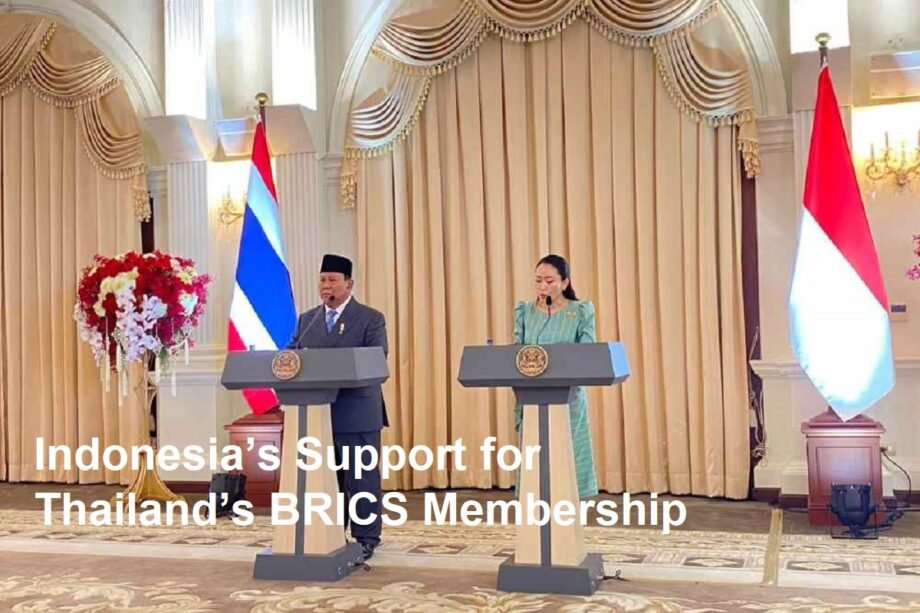In a significant development for regional economic cooperation, President Prabowo Subianto of the Republic of Indonesia has publicly expressed his readiness to assist Thailand in becoming a member of the BRICS economic cooperation group. This statement marks a strategic move that could reshape Southeast Asia’s role in the global economic landscape.
What is BRICS and Why Does It Matter?
BRICS is an influential coalition of five major emerging economies: Brazil, Russia, India, China, and South Africa. Established to foster economic, political, and cultural cooperation, BRICS has grown into a powerful bloc that represents a substantial portion of the world’s population and GDP. The group aims to promote mutual development, reform global governance, and enhance economic collaboration among its members.
Thailand’s potential membership in BRICS would not only elevate its international economic standing but also strengthen the collective influence of Southeast Asia within this global alliance. Indonesia’s support, as voiced by President Prabowo, is a crucial endorsement that could facilitate Thailand’s entry into this prestigious group.
President Prabowo’s Commitment to Regional Economic Growth
During a recent official statement, President Prabowo emphasized Indonesia’s commitment to fostering stronger economic ties within the region. He highlighted the importance of collaboration among emerging economies to address common challenges such as sustainable development, trade diversification, and technological innovation.
“Indonesia stands ready to support Thailand’s aspirations to join BRICS,” President Prabowo said. “Our cooperation will not only benefit our two nations but also contribute to the broader economic stability and growth of Southeast Asia.”
This declaration aligns with Indonesia’s broader foreign policy goals of enhancing regional integration and promoting economic diplomacy. By backing Thailand’s BRICS membership, Indonesia is positioning itself as a key player in shaping the future of multilateral economic cooperation.
The Strategic Benefits of Thailand Joining BRICS
Thailand’s inclusion in BRICS could bring several strategic advantages:
- Economic Diversification: Thailand would gain access to new markets and investment opportunities within the BRICS network, reducing dependence on traditional Western economies.
- Political Influence: Membership would amplify Thailand’s voice in global economic governance, allowing it to participate in shaping international trade and development policies.
- Technological Collaboration: BRICS countries are increasingly focusing on innovation and technology sharing, which could accelerate Thailand’s digital economy and infrastructure development.
- Regional Stability: Enhanced cooperation among Southeast Asian nations within BRICS could promote political stability and economic resilience in the face of global uncertainties.
Expert Opinions and Credible Sources
According to Dr. Siti Nurhaliza, a Southeast Asia economic analyst at the University of Jakarta, “Indonesia’s support for Thailand’s BRICS membership is a strategic move that reflects the shifting dynamics of global economic power. It underscores the growing importance of emerging economies in shaping the future of international trade and cooperation.”
Furthermore, the BRICS New Development Bank (NDB) has expressed openness to expanding its membership to include more emerging economies that align with its development goals. This institutional readiness adds momentum to Thailand’s bid, supported by Indonesia’s diplomatic backing.
What This Means for Southeast Asia and Beyond
Indonesia’s pledge to assist Thailand in joining BRICS signals a new chapter in regional cooperation. It highlights the increasing desire among Southeast Asian nations to assert their economic interests on the global stage. This move could encourage other countries in the region to seek closer ties with BRICS, potentially leading to a broader coalition of emerging economies.
Moreover, this development aligns with global trends where emerging markets are gaining more influence in international affairs, challenging the traditional dominance of Western powers. Indonesia and Thailand’s collaboration within BRICS could serve as a model for other nations aiming to enhance their economic sovereignty and global partnerships.
Conclusion
President Prabowo Subianto’s announcement of Indonesia’s support for Thailand’s BRICS membership is a landmark moment in regional economic diplomacy. It reflects a shared vision of stronger cooperation among emerging economies to foster sustainable growth, innovation, and political influence. As Thailand moves closer to joining BRICS, backed by Indonesia’s commitment, Southeast Asia’s role in the global economy is set to become more prominent and impactful.









